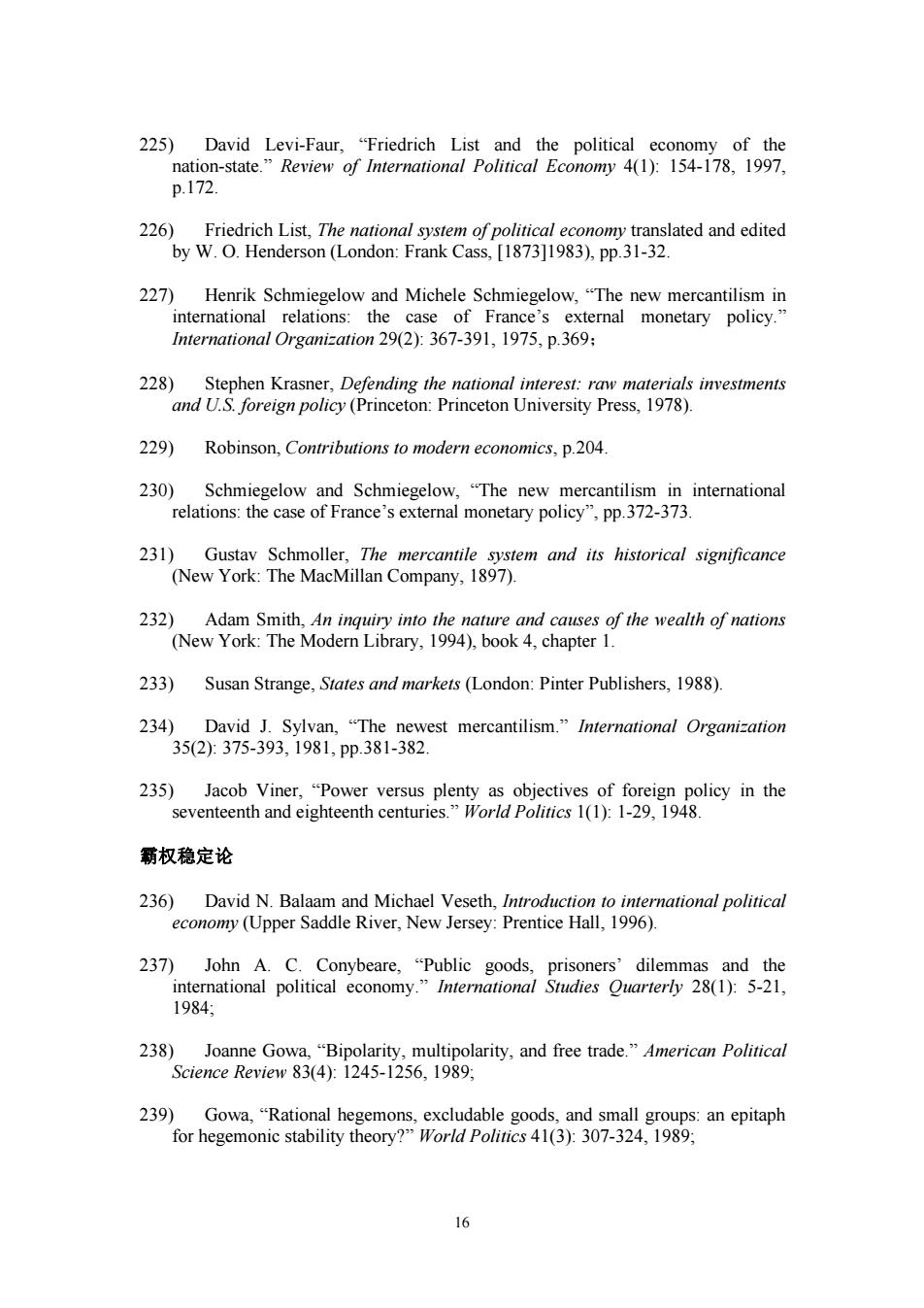
225)David Levi-Faur,"Friedrich List and the political economy of the nation-state."Review of International Political Economy 4(1):154-178,1997, p.172. 226)Friedrich List,The national system ofpolitical economy translated and edited by W.O.Henderson (London:Frank Cass,[1873]1983),pp.31-32. 227)Henrik Schmiegelow and Michele Schmiegelow,"The new mercantilism in international relations:the case of France's external monetary policy." International Organization 29(2):367-391,1975,p.369: 228)Stephen Krasner,Defending the national interest:raw materials investments and U.S.foreign policy (Princeton:Princeton University Press,1978). 229) Robinson,Contributions to modern economics,p.204. 230)Schmiegelow and Schmiegelow,"The new mercantilism in international relations:the case of France's external monetary policy",pp.372-373. 231)Gustay Schmoller,The mercantile system and its historical significance (New York:The MacMillan Company,1897). 232)Adam Smith,An inquiry into the nature and causes of the wealth of nations (New York:The Modern Library,1994),book 4,chapter 1. 233)Susan Strange,States and markets (London:Pinter Publishers,1988). 234)David J.Sylvan,"The newest mercantilism."International Organization 35(2):375-393,1981,pp.381-382 235)Jacob Viner,"Power versus plenty as objectives of foreign policy in the seventeenth and eighteenth centuries."World Politics 1(1):1-29,1948. 霸权稳定论 236)David N.Balaam and Michael Veseth,Introduction to international political economy (Upper Saddle River,New Jersey:Prentice Hall,1996). 237)John A.C.Conybeare,"Public goods,prisoners'dilemmas and the international political economy."International Studies Ouarterly 28(1):5-21, 1984: 238)Joanne Gowa,"Bipolarity,multipolarity,and free trade."American Political Science Review83(4):1245-1256,1989, 239)Gowa,"Rational hegemons,excludable goods,and small groups:an epitaph for hegemonic stability theory?"World Politics 41(3):307-324,1989; 16
16 225) David Levi-Faur, “Friedrich List and the political economy of the nation-state.” Review of International Political Economy 4(1): 154-178, 1997, p.172. 226) Friedrich List, The national system of political economy translated and edited by W. O. Henderson (London: Frank Cass, [1873]1983), pp.31-32. 227) Henrik Schmiegelow and Michele Schmiegelow, “The new mercantilism in international relations: the case of France’s external monetary policy.” International Organization 29(2): 367-391, 1975, p.369; 228) Stephen Krasner, Defending the national interest: raw materials investments and U.S. foreign policy (Princeton: Princeton University Press, 1978). 229) Robinson, Contributions to modern economics, p.204. 230) Schmiegelow and Schmiegelow, “The new mercantilism in international relations: the case of France’s external monetary policy”, pp.372-373. 231) Gustav Schmoller, The mercantile system and its historical significance (New York: The MacMillan Company, 1897). 232) Adam Smith, An inquiry into the nature and causes of the wealth of nations (New York: The Modern Library, 1994), book 4, chapter 1. 233) Susan Strange, States and markets (London: Pinter Publishers, 1988). 234) David J. Sylvan, “The newest mercantilism.” International Organization 35(2): 375-393, 1981, pp.381-382. 235) Jacob Viner, “Power versus plenty as objectives of foreign policy in the seventeenth and eighteenth centuries.” World Politics 1(1): 1-29, 1948. 霸权稳定论 236) David N. Balaam and Michael Veseth, Introduction to international political economy (Upper Saddle River, New Jersey: Prentice Hall, 1996). 237) John A. C. Conybeare, “Public goods, prisoners’ dilemmas and the international political economy.” International Studies Quarterly 28(1): 5-21, 1984; 238) Joanne Gowa, “Bipolarity, multipolarity, and free trade.” American Political Science Review 83(4): 1245-1256, 1989; 239) Gowa, “Rational hegemons, excludable goods, and small groups: an epitaph for hegemonic stability theory?” World Politics 41(3): 307-324, 1989;
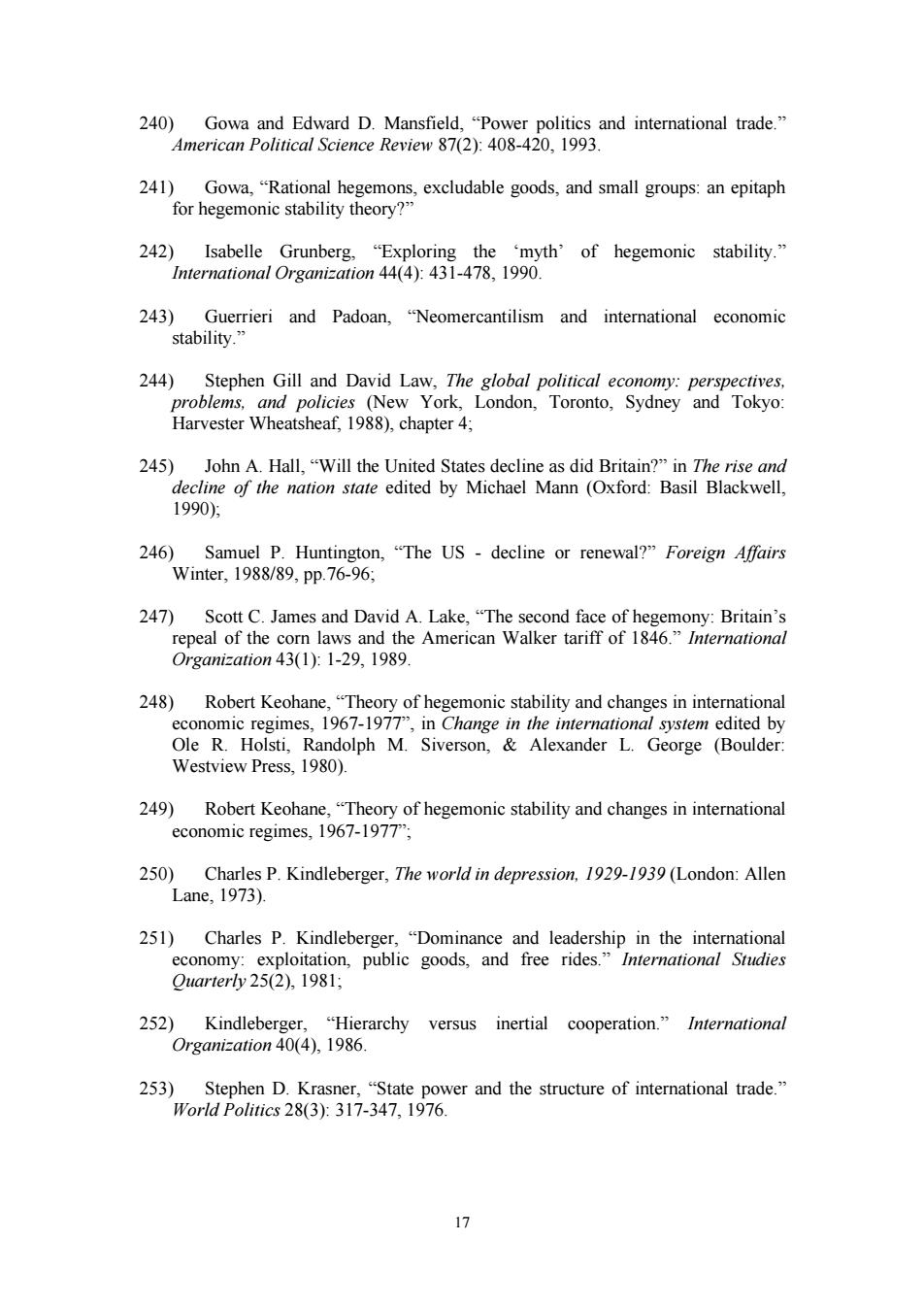
240)Gowa and Edward D.Mansfield,"Power politics and international trade." American Political Science Review 87(2):408-420,1993. 241)Gowa,"Rational hegemons,excludable goods,and small groups:an epitaph for hegemonic stability theory?" 242)Isabelle Grunberg,"Exploring the myth'of hegemonic stability." International Organization 44(4):431-478,1990. 243)Guerrieri and Padoan,"Neomercantilism and international economic stability.” 244)Stephen Gill and David Law,The global political economy:perspectives, problems,and policies (New York,London,Toronto,Sydney and Tokyo: Harvester Wheatsheaf,1988),chapter 4; 245)John A.Hall,"Will the United States decline as did Britain?"in The rise and decline of the nation state edited by Michael Mann (Oxford:Basil Blackwell, 1990): 246)Samuel P.Huntington,"The US decline or renewal?"Foreign Affairs Winter,1988/89,pp.76-96, 247)Scott C.James and David A.Lake,"The second face of hegemony:Britain's repeal of the corn laws and the American Walker tariff of 1846."International Organization 43(1):1-29,1989. 248) Robert Keohane,"Theory of hegemonic stability and changes in international economic regimes,1967-1977",in Change in the international system edited by Ole R.Holsti,Randolph M.Siverson,Alexander L.George (Boulder: Westview Press,1980) 249)Robert Keohane,"Theory of hegemonic stability and changes in international economic regimes,1967-1977"; 250)Charles P.Kindleberger,The world in depression,1929-1939 (London:Allen Lane,1973). 251)Charles P.Kindleberger,"Dominance and leadership in the international economy:exploitation,public goods,and free rides."International Studies Quarterly 25(2),1981; 252)Kindleberger,"Hierarchy versus inertial cooperation."International Organization 40(4),1986. 253)Stephen D.Krasner,"State power and the structure of international trade." World Politics 28(3):317-347,1976. 17
17 240) Gowa and Edward D. Mansfield, “Power politics and international trade.” American Political Science Review 87(2): 408-420, 1993. 241) Gowa, “Rational hegemons, excludable goods, and small groups: an epitaph for hegemonic stability theory?” 242) Isabelle Grunberg, “Exploring the ‘myth’ of hegemonic stability.” International Organization 44(4): 431-478, 1990. 243) Guerrieri and Padoan, “Neomercantilism and international economic stability.” 244) Stephen Gill and David Law, The global political economy: perspectives, problems, and policies (New York, London, Toronto, Sydney and Tokyo: Harvester Wheatsheaf, 1988), chapter 4; 245) John A. Hall, “Will the United States decline as did Britain?” in The rise and decline of the nation state edited by Michael Mann (Oxford: Basil Blackwell, 1990); 246) Samuel P. Huntington, “The US - decline or renewal?” Foreign Af airs Winter, 1988/89, pp.76-96; 247) Scott C. James and David A. Lake, “The second face of hegemony: Britain’s repeal of the corn laws and the American Walker tariff of 1846.” International Organization 43(1): 1-29, 1989. 248) Robert Keohane, “Theory of hegemonic stability and changes in international economic regimes, 1967-1977”, in Change in the international system edited by Ole R. Holsti, Randolph M. Siverson, & Alexander L. George (Boulder: Westview Press, 1980). 249) Robert Keohane, “Theory of hegemonic stability and changes in international economic regimes, 1967-1977”; 250) Charles P. Kindleberger, The world in depression, 1929-1939 (London: Allen Lane, 1973). 251) Charles P. Kindleberger, “Dominance and leadership in the international economy: exploitation, public goods, and free rides.” International Studies Quarterly 25(2), 1981; 252) Kindleberger, “Hierarchy versus inertial cooperation.” International Organization 40(4), 1986. 253) Stephen D. Krasner, “State power and the structure of international trade.” World Politics 28(3): 317-347, 1976
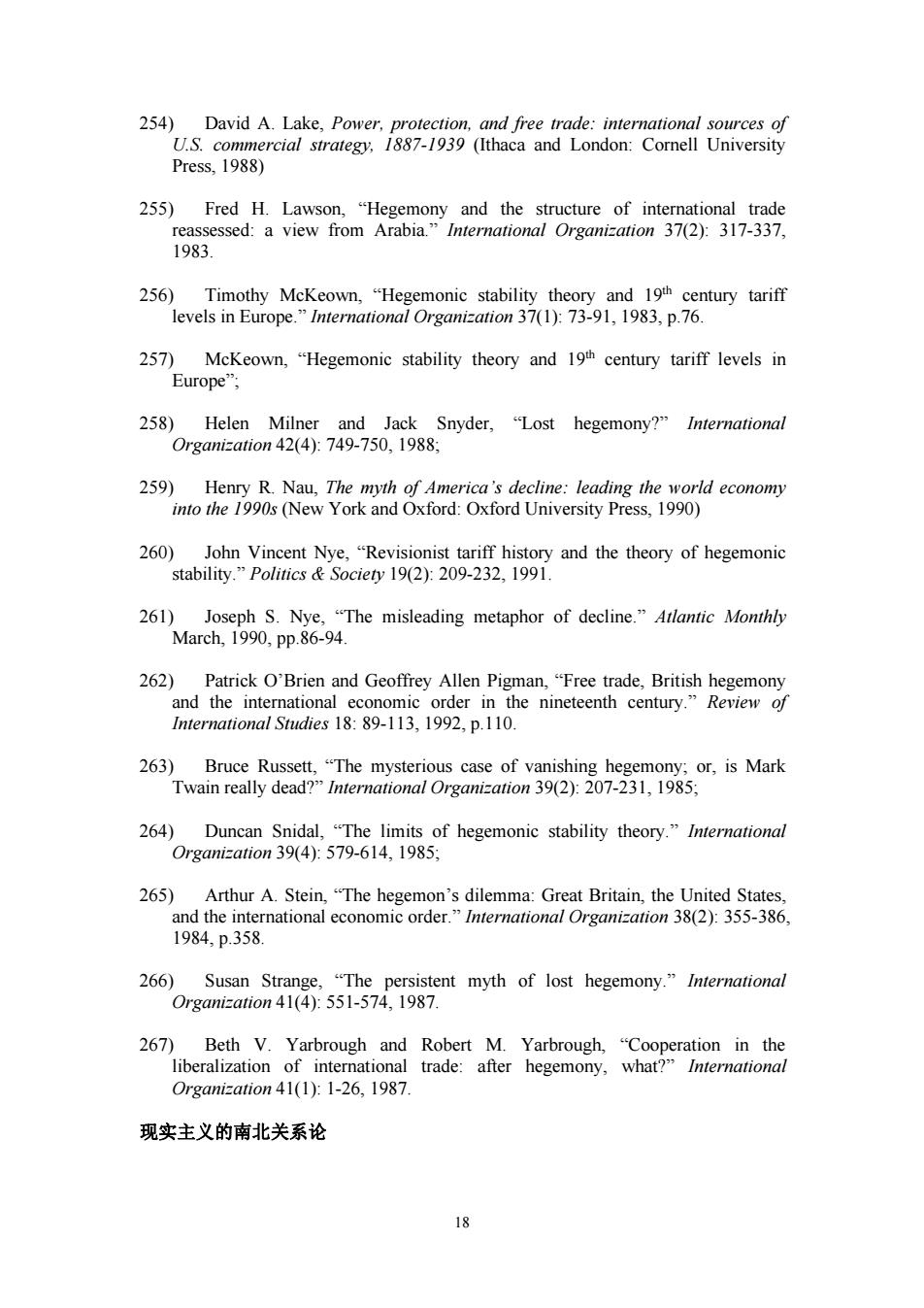
254)David A.Lake,Power,protection,and free trade:international sources of U.S.commercial strategy,1887-1939 (Ithaca and London:Cornell University Press,1988) 255)Fred H.Lawson,"Hegemony and the structure of international trade reassessed:a view from Arabia."International Organization 37(2):317-337, 1983. 256)Timothy McKeown,"Hegemonic stability theory and 19th century tariff levels in Europe."International Organization 37(1):73-91,1983,p.76. 257)McKeown,"Hegemonic stability theory and 19th century tariff levels in Europe"; 258)Helen Milner and Jack Snyder,"Lost hegemony?"International Organization42(4):749-750,1988, 259)Henry R.Nau,The myth of America's decline:leading the world economy into the 1990s (New York and Oxford:Oxford University Press,1990) 260)John Vincent Nye,"Revisionist tariff history and the theory of hegemonic stability."Politics Society 19(2):209-232,1991. 261)Joseph S.Nye,"The misleading metaphor of decline."Atlantic Monthly March,1990,pp.86-94. 262)Patrick O'Brien and Geoffrey Allen Pigman,"Free trade,British hegemony and the international economic order in the nineteenth century."Review of International Studies 18:89-113,1992,p.110. 263)Bruce Russett,"The mysterious case of vanishing hegemony;or,is Mark Twain really dead?"International Organization 39(2):207-231,1985; 264)Duncan Snidal,"The limits of hegemonic stability theory."International Organization39(4):579-614,1985; 265)Arthur A.Stein,"The hegemon's dilemma:Great Britain,the United States, and the international economic order."International Organization 38(2):355-386. 1984,p.358. 266)Susan Strange,"The persistent myth of lost hegemony."International Organization41(4):551-574,1987. 267)Beth V.Yarbrough and Robert M.Yarbrough,"Cooperation in the liberalization of international trade:after hegemony,what?"International Organization41(1):片1-26,1987. 现实主义的南北关系论 18
18 254) David A. Lake, Power, protection, and free trade: international sources of U.S. commercial strategy, 1887-1939 (Ithaca and London: Cornell University Press, 1988) 255) Fred H. Lawson, “Hegemony and the structure of international trade reassessed: a view from Arabia.” International Organization 37(2): 317-337, 1983. 256) Timothy McKeown, “Hegemonic stability theory and 19 th century tariff levels in Europe.” International Organization 37(1): 73-91, 1983, p.76. 257) McKeown, “Hegemonic stability theory and 19 th century tariff levels in Europe”; 258) Helen Milner and Jack Snyder, “Lost hegemony?” International Organization 42(4): 749-750, 1988; 259) Henry R. Nau, The myth of America’s decline: leading the world economy into the 1990s (New York and Oxford: Oxford University Press, 1990) 260) John Vincent Nye, “Revisionist tariff history and the theory of hegemonic stability.” Politics & Society 19(2): 209-232, 1991. 261) Joseph S. Nye, “The misleading metaphor of decline.” Atlantic Monthly March, 1990, pp.86-94. 262) Patrick O’Brien and Geoffrey Allen Pigman, “Free trade, British hegemony and the international economic order in the nineteenth century.” Review of International Studies 18: 89-113, 1992, p.110. 263) Bruce Russett, “The mysterious case of vanishing hegemony; or, is Mark Twain really dead?” International Organization 39(2): 207-231, 1985; 264) Duncan Snidal, “The limits of hegemonic stability theory.” International Organization 39(4): 579-614, 1985; 265) Arthur A. Stein, “The hegemon’s dilemma: Great Britain, the United States, and the international economic order.” International Organization 38(2): 355-386, 1984, p.358. 266) Susan Strange, “The persistent myth of lost hegemony.” International Organization 41(4): 551-574, 1987. 267) Beth V. Yarbrough and Robert M. Yarbrough, “Cooperation in the liberalization of international trade: after hegemony, what?” International Organization 41(1): 1-26, 1987. 现实主义的南北关系论
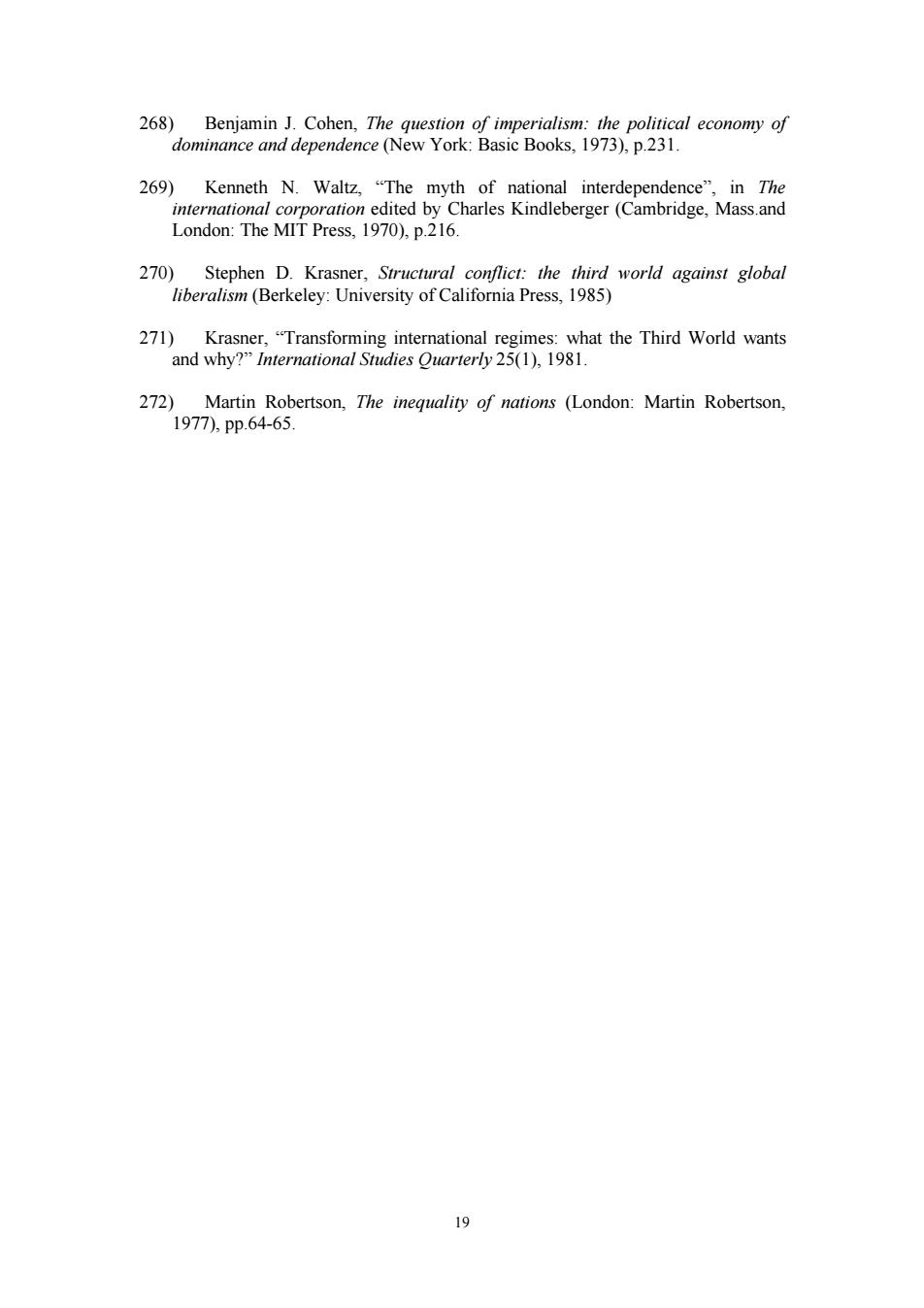
268)Benjamin J.Cohen,The question of imperialism:the political economy of dominance and dependence (New York:Basic Books,1973),p.231. 269)Kenneth N.Waltz,"The myth of national interdependence",in The international corporation edited by Charles Kindleberger (Cambridge,Mass.and London:The MIT Press,1970),p.216. 270)Stephen D.Krasner,Structural conflict:the third world against global liberalism(Berkeley:University of California Press,1985) 271)Krasner,"Transforming international regimes:what the Third World wants and why?"International Studies Quarterly 25(1),1981. 272)Martin Robertson,The ineguality of nations (London:Martin Robertson, 1977),pp.64-65. 9
19 268) Benjamin J. Cohen, The question of imperialism: the political economy of dominance and dependence (New York: Basic Books, 1973), p.231. 269) Kenneth N. Waltz, “The myth of national interdependence”, in The international corporation edited by Charles Kindleberger (Cambridge, Mass.and London: The MIT Press, 1970), p.216. 270) Stephen D. Krasner, Structural conflict: the third world against global liberalism (Berkeley: University of California Press, 1985) 271) Krasner, “Transforming international regimes: what the Third World wants and why?” International Studies Quarterly 25(1), 1981. 272) Martin Robertson, The inequality of nations (London: Martin Robertson, 1977), pp.64-65
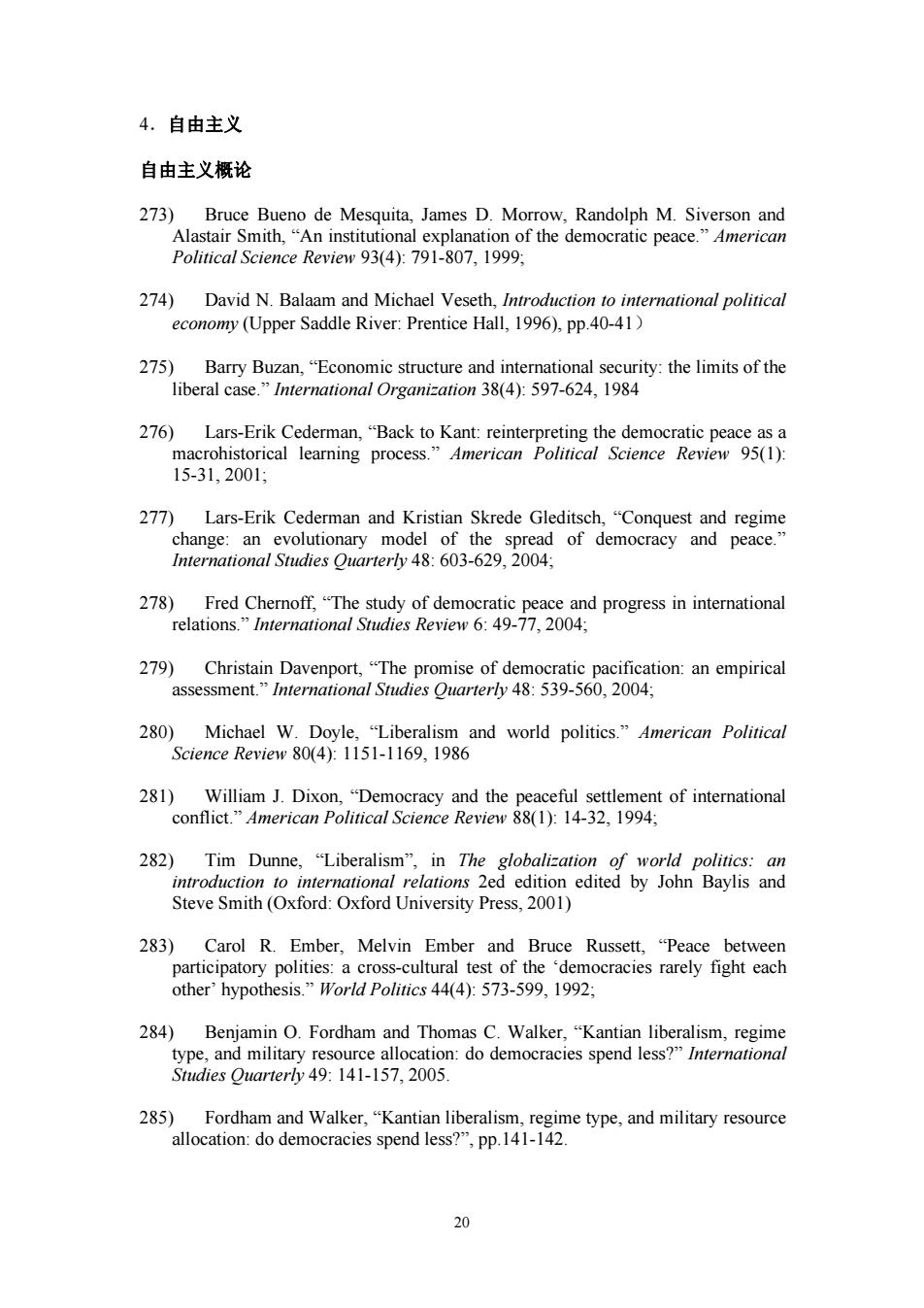
4.自由主义 自由主义概论 273)Bruce Bueno de Mesquita,James D.Morrow,Randolph M.Siverson and Alastair Smith,"An institutional explanation of the democratic peace."American Political Science Review 93(4):791-807,1999: 274)David N.Balaam and Michael Veseth,Introduction to international political economy (Upper Saddle River:Prentice Hall,1996),pp.40-41) 275)Barry Buzan,"Economic structure and international security:the limits of the liberal case."International Organization 38(4):597-624,1984 276)Lars-Erik Cederman,"Back to Kant:reinterpreting the democratic peace as a macrohistorical learning process."American Political Science Review 95(1): 15-31,2001; 277)Lars-Erik Cederman and Kristian Skrede Gleditsch,"Conquest and regime change:an evolutionary model of the spread of democracy and peace." International Studies Quarterly 48:603-629,2004; 278)Fred Chernoff,"The study of democratic peace and progress in international relations."International Studies Review 6:49-77,2004: 279)Christain Davenport,"The promise of democratic pacification:an empirical assessment."International Studies Quarterly 48:539-560,2004; 280)Michael W.Doyle,"Liberalism and world politics."American Political Science Review80(4):1151-1169,1986 281)William J.Dixon,"Democracy and the peaceful settlement of international conflict."American Political Science Review 88(1):14-32,1994; 282)Tim Dunne,"Liberalism",in The globalization of world politics:an introduction to international relations 2ed edition edited by John Baylis and Steve Smith(Oxford:Oxford University Press,2001) 283)Carol R.Ember,Melvin Ember and Bruce Russett,"Peace between participatory polities:a cross-cultural test of the 'democracies rarely fight each other'hypothesis."World Politics 44(4):573-599,1992; 284)Benjamin O.Fordham and Thomas C.Walker,"Kantian liberalism,regime type,and military resource allocation:do democracies spend less?"International Studies Quarterly 49:141-157,2005. 285)Fordham and Walker,"Kantian liberalism,regime type,and military resource allocation:do democracies spend less?",pp.141-142. 20
20 4.自由主义 自由主义概论 273) Bruce Bueno de Mesquita, James D. Morrow, Randolph M. Siverson and Alastair Smith, “An institutional explanation of the democratic peace.” American Political Science Review 93(4): 791-807, 1999; 274) David N. Balaam and Michael Veseth, Introduction to international political economy (Upper Saddle River: Prentice Hall, 1996), pp.40-41) 275) Barry Buzan, “Economic structure and international security: the limits of the liberal case.” International Organization 38(4): 597-624, 1984 276) Lars-Erik Cederman, “Back to Kant: reinterpreting the democratic peace as a macrohistorical learning process.” American Political Science Review 95(1): 15-31, 2001; 277) Lars-Erik Cederman and Kristian Skrede Gleditsch, “Conquest and regime change: an evolutionary model of the spread of democracy and peace.” International Studies Quarterly 48: 603-629, 2004; 278) Fred Chernoff, “The study of democratic peace and progress in international relations.” International Studies Review 6: 49-77, 2004; 279) Christain Davenport, “The promise of democratic pacification: an empirical assessment.” International Studies Quarterly 48: 539-560, 2004; 280) Michael W. Doyle, “Liberalism and world politics.” American Political Science Review 80(4): 1151-1169, 1986 281) William J. Dixon, “Democracy and the peaceful settlement of international conflict.” American Political Science Review 88(1): 14-32, 1994; 282) Tim Dunne, “Liberalism”, in The globalization of world politics: an introduction to international relations 2ed edition edited by John Baylis and Steve Smith (Oxford: Oxford University Press, 2001) 283) Carol R. Ember, Melvin Ember and Bruce Russett, “Peace between participatory polities: a cross-cultural test of the ‘democracies rarely fight each other’ hypothesis.” World Politics 44(4): 573-599, 1992; 284) Benjamin O. Fordham and Thomas C. Walker, “Kantian liberalism, regime type, and military resource allocation: do democracies spend less?” International Studies Quarterly 49: 141-157, 2005. 285) Fordham and Walker, “Kantian liberalism, regime type, and military resource allocation: do democracies spend less?”, pp.141-142